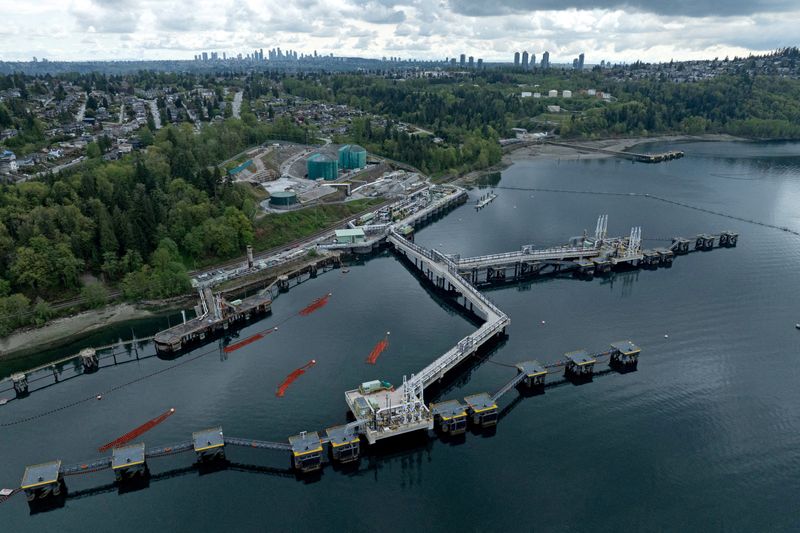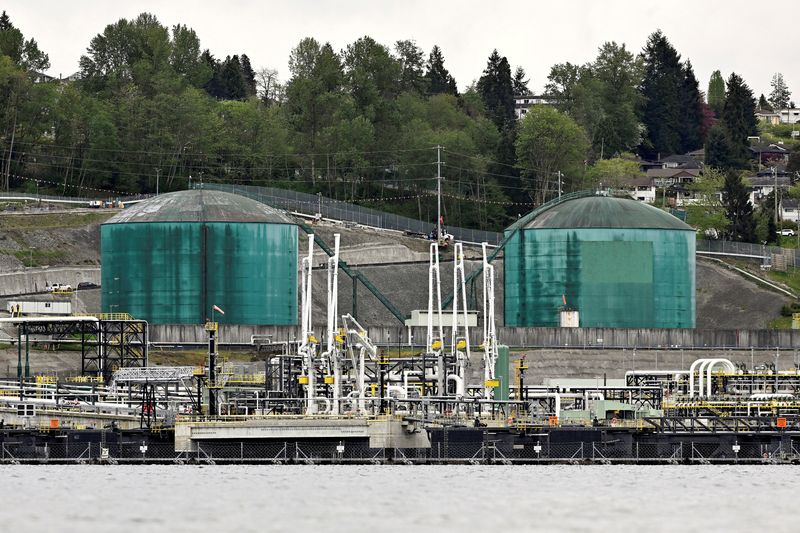By Nia Williams
(Reuters) - The Trans Mountain oil pipeline expansion (TMX (TSX:X)) was meant to shrink the discount on Canadian oil versus U.S. crude but three months in the differential is wider than when commercial operations on the project started.
Many analysts had forecast the differential on Western Canada Select (WCS) versus U.S. crude would gradually narrow to single digits thanks to the extra 590,000 barrels per day (bpd) of export capacity offered by TMX.
But instead WCS for delivery in Hardisty, Alberta, is trading around $15 a barrel below benchmark West Texas Intermediate (WTI) oil, versus $11.75 a barrel under the U.S. crude on May 1, the first day of commercial operations. WTI has declined in recent weeks to less than $74 a barrel.
Oil companies in Canada, the world's fourth-largest crude producer, have struggled for years with production outpacing the space available on export pipelines, causing crude to get bottlenecked in Alberta. TMX's start-up means Canada finally has spare pipeline capacity, but the expected boost to prices has not materialized.
On earnings calls last week, Cenovus Energy (TSX:CVE) and Canadian Natural Resources Ltd (TSX:CNQ), both major shippers on TMX, blamed a number of factors.
These include increased competition on the U.S. Gulf Coast from Mexican heavy crude imports and U.S. refinery outages including ExxonMobil's 251,800-bpd Joliet, Illinois, plant that took most of its units offline after losing power following a tornado last month and has not yet fully restarted.
Even so, company executives remained optimistic that the WCS discount would start to narrow in coming months.
"Over the next little while I would say we expect Trans Mountain to continue to have its intended impact in Alberta and differentials to be as narrow as they have been in a long time," said Geoff Murray, executive vice-president of commercial at Cenovus.
"The important thing around Trans Mountain is we've seen the facility come online. It's up, it's operating and it's operating well."
RBC (TSX:RY) Capital Markets analyst Greg Pardy said pipeline egress out of western Canada appeared to be running smoothly.
"The main fly in the ointment may be elevated inventory levels in select U.S. regions, but time will tell," he wrote in a note to clients.
Weak demand from major sour crude consumer China was also weighing on heavy oil grades globally, said Rory Johnston, founder of the Commodity Context newsletter, adding that expectations that expanding Trans Mountain would significantly narrow WCS differentials had been overdone.

"The main value of TMX wasn't really a low WCS differential but rather a vastly lower probability of another differential blowout, which fingers crossed we still aren't going to see here even if we're back above $15," Johnston said.
Prior to TMX's start-up, Canadian producers were vulnerable to congestion on export pipelines occasionally triggering WCS "blowouts" in which the discount plunged to more $40 a barrel below U.S. crude, costing them millions of dollars in revenues.
